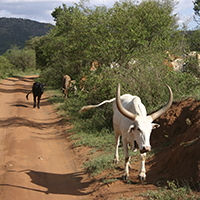 Professor Eric Fèvre: “The strategy is not to develop a completely new system but to strengthen and integrate surveillance for zoonotic diseases”
Professor Eric Fèvre: “The strategy is not to develop a completely new system but to strengthen and integrate surveillance for zoonotic diseases”
The University of Liverpool has been awarded funding to start a surveillance programme aimed at reducing the incidence of diseases transmitted between people and livestock in western Kenya.
The £3.6 million grant will train veterinary and medical technicians to monitor farms, markets and slaughterhouses using a mobile data collection system and generate a comprehensive database of the prevalence and economic impact of these diseases that can be used to provide evidence for government health policy in the area.
More intensive methods
The area around Lake Victoria is among the most densely populated in East Africa and is currently experiencing a rapidly growing population. To meet increasing demand, many livestock farmers are moving from subsistence farming to more intensive methods.
However, livestock in the area are characterised by having high levels of zoonoses – diseases which are transmitted to humans from animals. In the past this has led to outbreaks of bovine tuberculosis, Rift Valley fever, brucellosis and anthrax, but there is little data on which livestock are infected and by which diseases.
As farming practice intensifies, farmers are being required to provide more data on the health of the sheep, goats, cattle and pigs they sell, with some meat companies introducing a blanket ban on products from this area.
Epidemiologist in the University’s Institute of Infection and Global Health, Professor Eric Fèvre, said: “Kenya is experiencing radical change in the way it produces meat for its growing population. However, the system for checking the quality and safety of this meat is not equipped to deal with the pace of change.
“This has a major impact on public health that is only going to grow as the population expands.”
The project will last for five years and will closely involve the Kenyan government’s Zoonotic Disease Unit, leaving a trained group of technicians, a comprehensive dataset and sample selection and the framework for a national surveillance system which can be adopted in the future.
Professor Fèvre said: “There is a lot of science behind how diseases are controlled and managed, but very little science around how to best do undertake surveillance.
Strengthen and integrate
“The strategy is not to develop a completely new system but to strengthen and integrate surveillance for zoonotic diseases. The project will also generate data on zoonotic disease burdens and develop an understanding of the relationships between demographic, economic and social factors and the epidemiology of zoonoses.”
The £3.6m Zoonoses in Livestock in Kenya project (ZooLinK ) project is being funded through the ‘Zoonoses in Emerging Livestock Systems’ (ZELS) programme: a joint research initiative between the Department for International Development, and the BBSRC, ESRC, MRC, NERC and DSTL.
Partners include the University of Edinburgh, the Royal Veterinary College, the University of Nottingham, the Kenya Medical Research Institute, the International Livestock Research Institute, the University of Nairobi and the Kenya Government Zoonotic Disease Unit.
